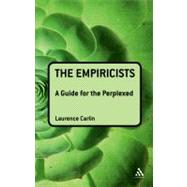
What is included with this book?
| Preface | p. ix |
| Introduction: The Empiricists and Their Context | p. 1 |
| Empiricism and the Empiricists | p. 1 |
| The Intellectual Background to the Early Modern Empiricists | p. 3 |
| Martin Luther and the Reformation | p. 4 |
| Aristotelian cosmology and the Scientific Revolution | p. 5 |
| Aristotelian/Scholastic hylomorphism and the rise of mechanism | p. 7 |
| The Royal Society of London | p. 11 |
| Francis Bacon (1561-1626) | p. 13 |
| The Natural Realm: The Idols of the Mind | p. 14 |
| Idols of the Tribe | p. 15 |
| Idols of the Cave | p. 17 |
| Idols of the Marketplace | p. 19 |
| Idols of the Theatre | p. 21 |
| Knowledge and Experience: Induction Introduced | p. 23 |
| Aristotelian/Scholastic syllogisms: deductions dismissed | p. 23 |
| Baconian empiricism: induction introduced | p. 24 |
| Conclusion: Bacon the Empiricist | p. 28 |
| Thomas Hobbes (1588-1679) | p. 30 |
| The Natural Realm: Hobbes's Materialistic Mechanism | p. 31 |
| The importance of motion | p. 32 |
| Sensation and the mind | p. 35 |
| Knowledge and Experience: Definitions and the Euclidean Method | p. 41 |
| Two kinds of knowledge and proper ratiocination | p. 41 |
| The method of analysis and the method of synthesis | p. 43 |
| Conclusion: Hobbes the Empiricist | p. 48 |
| Pierre Gassendi (1592-1655) | p. 50 |
| The Natural Realm: Gassendi's Atomism | p. 51 |
| The basic principles of Gassendi's atomism | p. 51 |
| Atomistic sensation | p. 55 |
| Knowledge and Experience: The 'Middle Way' to Knowledge | p. 57 |
| The sceptics are partly correct | p. 57 |
| Knowledge regained? | p. 59 |
| Conclusion: Gassendi the Empiricist | p. 61 |
| Robert Boyle (1627-1691) | p. 62 |
| The Natural Realm: Boyle's Mechanism ('Corpuscularianism') | p. 64 |
| The basic principles of Boyle's mechanism (or 'corpscularianism') | p. 65 |
| Sensation and the mind | p. 70 |
| Knowledge and Experience: Mechanism and the Cautious Experimenter | p. 72 |
| The excellency of mechanism | p. 72 |
| Experimentation and the status of mechanism | p. 76 |
| Conclusion: Boyle the Empiricist | p. 77 |
| John Locke (1632-1704) | p. 78 |
| The Natural Realm: Locke's Mechanism | p. 81 |
| Against innatism | p. 82 |
| Ideas and the Tabula Rasa | p. 86 |
| Primary and secondary qualities, and our confused idea of substance | p. 88 |
| Locke on power | p. 94 |
| Knowledge and Experience: Locke's Epistemology | p. 96 |
| Indirect realism, or the representational theory of perception | p. 97 |
| The certainty of knowledge | p. 99 |
| The origin of knowledge | p. 102 |
| The extent of knowledge | p. 106 |
| Conclusion: Locke the Empiricist | p. 110 |
| Isaac Newton (1642-1727) | p. 112 |
| The Natural Realm: Newton's Principia | p. 115 |
| A world of forces: universal gravitation | p. 116 |
| What kind of quality is gravity? | p. 117 |
| Mechanism and action at a distance | p. 121 |
| Knowledge and Experience: Rules for the Study of Natural Philosophy | p. 123 |
| The four rules | p. 123 |
| Whither natural philosophy? | p. 125 |
| Conclusion: Newton the Empiricist | p. 126 |
| George Berkeley (1685-1753) | p. 128 |
| The Natural Realm: Berkeley's Idealism | p. 130 |
| The world contains only souls and ideas | p. 130 |
| Esse est percipi: two arguments for idealism/immaterialism | p. 133 |
| Against the primary/secondary quality distinction | p. 137 |
| Knowledge and Experience: Berkeley's Common Sense Epistemology | p. 139 |
| Against the representational theory of perception | p. 139 |
| Defeating the sceptic, and returning to common sense | p. 143 |
| Mechanism, Newtonianism and instrumentalism: Berkeley on the new science | p. 144 |
| Responses to popular objections | p. 150 |
| Conclusion: Berkeley the Empiricist | p. 153 |
| David Hume (1711-1776) | p. 155 |
| The Natural Realm: Hume's Psychological Approach | p. 157 |
| Impressions and ideas | p. 158 |
| The principles of association | p. 160 |
| Knowledge and Experience: Hume's Semi-Scepticism | p. 161 |
| Relations of ideas vs. matters of fact | p. 161 |
| From matters of fact to cause and effect: Hume's first question | p. 163 |
| Knowledge of cause and effect: Hume's second question | p. 164 |
| The problem of induction: Hume's third question | p. 170 |
| Hume's positive account of causation: induction regained? | p. 174 |
| Conclusion: Hume the Empiricist | p. 177 |
| Empiricism and the Empiricists: Summary and Conclusion | p. 178 |
| Bibliography | p. 181 |
| Index | p. 185 |
| Table of Contents provided by Ingram. All Rights Reserved. |
The New copy of this book will include any supplemental materials advertised. Please check the title of the book to determine if it should include any access cards, study guides, lab manuals, CDs, etc.
The Used, Rental and eBook copies of this book are not guaranteed to include any supplemental materials. Typically, only the book itself is included. This is true even if the title states it includes any access cards, study guides, lab manuals, CDs, etc.